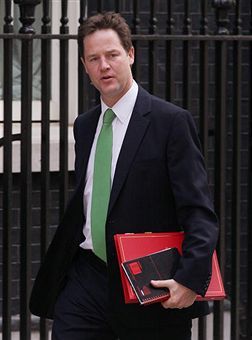 Nick Robinson’s documentary on the coalition negotiations is just under four hours away,
but I suspect we’ve already heard about one of its key moments. As various outlets are reporting this
afternoon, Nick Clegg tells Robinson that he had changed his mind about the pace of spending cuts sometime before the coalition agreement. Or as he puts it:
Nick Robinson’s documentary on the coalition negotiations is just under four hours away,
but I suspect we’ve already heard about one of its key moments. As various outlets are reporting this
afternoon, Nick Clegg tells Robinson that he had changed his mind about the pace of spending cuts sometime before the coalition agreement. Or as he puts it:
This matters because the Lib Dem manifesto said that spending shouldn’t be cut (above and beyond Labour’s plans) this year – and that the squeeze should wait until next year. So comes the question: was Nick Clegg deceiving voters during the election campaign? Labour say yes, but I think the issue is a little more complicated than that. The question should be something more like: does a party leader need to agree with every aspect of his party’s policy and, what’s more, announce it if he doesn’t? And I’m not sure there’s a clear-cut answer. After all, let’s say the Lib Dems won a majority in May: a Prime Minister Clegg could still have stuck by the manifesto policy even if he, in the quiet depths of his conscience, was unsure about it.“I changed my mind earlier than that … firstly remember between March and the actual general election … a financial earthquake occurred in on our European doorstep.”
Besides, Clegg’s claim shouldn’t be all that surprising. As I wrote before the election, all signs were that he, and people like David Laws, were just as hawkish on the public finances as the Tories, if not more so – and that the limper approach to deficit reduction came at Vince Cable’s insistence. If anything, Clegg’s “change of mind” may well have come as his profile started to eclipse Cable’s after the TV debates, and it has now been allowed to flourish in partnership with the Tories. This could well be a story about Clegg and Cable’s relative influence within the Lib Dems, as much as anything else.
This isn’t to say that Clegg doesn’t have questions to answer, particularly to his own party. The fact that Clegg was railing against ‘Tory cuts’ in May leaves a sour taste – was he, on some level, being dishonest then, or being dishonest now? But I’d prefer to characterise this apparent “U-turn” another way: once a hawk, always a hawk.






Comments